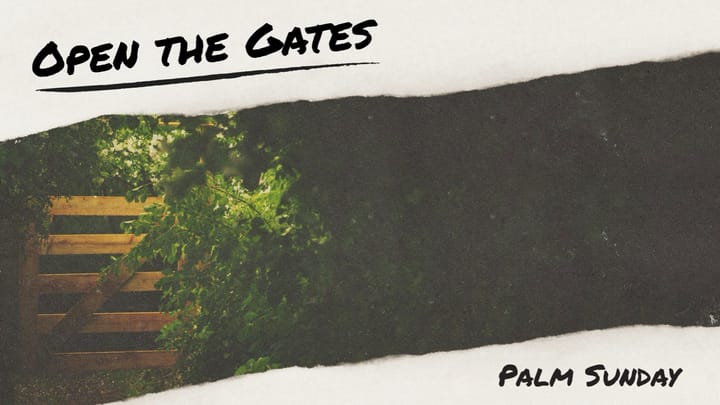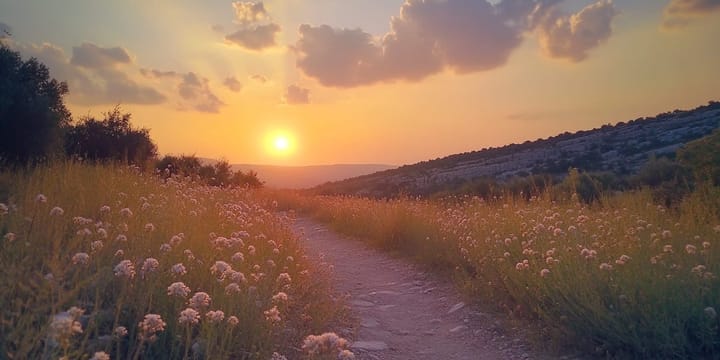Fairhaven Sermon 2-16-2025
In this week's service, Rev. Dylan Parson explores the question "why do we worship?" He notes that his own upbringing was unconventional, but finds himself drawn to worship because he believes it is essential for personal growth and connection with God.
Rev. Parson delves into the biblical context of Sabbath observance in Exodus 31:15-17, where God commands rest every seventh day. He argues that this concept is not just a day off, but a sacrifice of useful time and resources offered to God's sake. Parson encourages listeners to recommit themselves to regular worship as a means of grace for growth and transformation.
Travscript
You may or may not have gathered this about my biography over the years, but I did not grow up going to church. That was just not something my family did. I didn't start until I was probably 13, 12 or 13. And as far as I can remember, outside of weddings, which were pretty rare, I think I went to church one single time as a child.
We went to see my best friend's mom sing in the choir one Sunday morning. It was kind of a special occasion. She asked us to see her sing one time before the family moved to Florida. So it was a special solo for their final Sunday or something.
That family was United Methodist, so I guess Methodism was my first exposure to church. And most of my childhood friends who had any religion at all were Catholic. And I remember thinking as a non-church-going kid, Why do they do that every Sunday morning? Why do they go to church? I remember asking my mom that when I was little. Why do they go, and why don't we? And I mean, the answer was very obvious from our perspective, is that, you know, you sleep in, we get a nice breakfast.
And if you step back for a moment, if you set aside the habits that we've come to develop after either a short time or a lifetime of worship attendance, I think that's still a good question. Why do we worship? From kindergarten through retirement, most people only get a max of two days off a week, one of which is usually Sunday. And many of us, myself included, really do enjoy sleeping in once in a while, taking our time making breakfast, going out for brunch, maybe mowing the grass without having to be anywhere for the rest of the day. And a Sunday morning worship service really messes with all that.
It robs us of the very little free time that we get in our modern lifestyles. And for what? So we can sing songs together? I mean, who even does that anymore? That's not really a popular pastime. Is it to hear scripture? Well, you can conveniently read the Bible in the comfort of your own home, or you can go watch The Chosen or something. Is it because we do great mission work? Well, the Salvation Army, the Red Cross, Habitat for Humanity, countless other organizations do that better than we do, more effectively.
And is it for the sermon? I doubt it. You can definitely subscribe to far more gifted preachers than me. You can get the sermon delivered as a podcast right to your phone. Listen to it while you drive, while you go to work.
And it's very easy to see why people might choose not to spend precious Sunday morning hours here or in a place like this. So again, why do we worship? And this is an extremely important question for each of us. You'd better be able to articulate why you come to church if you're ever going to get someone else to go with you. We'd better be able to explain why it's important to us if we're ever going to convince someone new to faith or exploring faith that it should be important to them.
You may or may not know that regular collective corporate worship is not something that all religions do frequently. Muslims are the closest to us. They'll go to mosques. Some of them will multiple times a day to pray and worship.
Most go at least on Friday. That's their big sort of prayer day. Buddhists and Hindus though, billions of people, they don't have a standard practice of weekly worship. They'll go to the temple here and there, but a lot of their religious practice is at home by themselves.
They have little altars. Most modern observant Jews do often attend weekly services. Their Sabbath day is Saturday rather than Sunday, but it's not always been that way, biblically. Jews in Jesus' day were not gathering for worship one day a week per se.
That would be a totally foreign idea for them. Whenever you see synagogue in the Bible, that's not what they're doing. Sacrifice ritual revolved around the temple in Jerusalem, which is why we see in the Bible over and over again people making pilgrimages for major holidays, for festivals, to buy an animal as sacrifice, that sort of thing. They encountered God just in that one place.
We hear that in Jesus' discussion with a Samaritan woman at the well this morning in our gospel reading. The Jews worshiped God in Jerusalem because that's where God was believed to dwell in a very real way. Their Samaritan cousins, like the woman we hear from today, worshiped God in their temple on Mount Gerizim. Local synagogues were not like churches.
They weren't holding worship services, nothing like that. They were much more focused on education, on debate around the Torah. It was more of a study sort of thing. So whenever you read about Jesus or anyone else in Scripture going to the synagogue, it's really just not comparable to going to church.
So regular gathered worship in the form that we do it has not been an important focus for everybody everywhere, not even our Jewish forebears. So why is it for us? Well even if we do it differently than Jewish people do, less so now, we can trace it to our Jewish roots in the Old Testament, specifically to the practice of Sabbath. That's the focus of our Exodus reading this morning. It describes the institution of the Sabbath and the aftermath of the Hebrews' exodus from Egypt.
The Sabbath has a very particular purpose. It's not just a day off. That concept has had somewhat of a renaissance among Christians over the past few years. People have started talking about Sabbath a lot.
That's often how it's interpreted as a day off. But that's not right. It's not just a day of resting. That's just called a day off.
We have those. But at the same time, observe the Sabbath is not just another way of saying go to church either. It's not just checking off some kind of ritual box that we do this this day of the week because God said to. It's not that.
Neither of these concepts fully encompass what the Sabbath is supposed to be about. Instead, Sabbath should be understood as kind of a sacrifice offered to God. Think about that. It's giving up.
Useful time. And along with that time, resources in a self-giving kind of way. It's sacrificial because the Sabbath day is one whole seventh of the week. One whole seventh of your life.
And so if you don't work on the Sabbath, you're one seventh over 10 percent less productive than you otherwise could be. If you're not working on the Sabbath, you're making well over 10 percent less money. You're wasting a perfectly good work day, leaving stuff undone that you could otherwise be doing. And that's precisely the point.
It's a sacrifice for God. It's expressing trust that God will provide for us anyway and reminds us that it's God's grace, not our own effort, that is fundamental to our lives. You being here right now instead of cleaning the house or getting caught up on laundry or doing something you have to do is a sacrifice deciding that this time is for God and not us. And notice also that goes along with Sabbath, there's a social justice and environmental focus even in Exodus.
This is really interesting. Every seventh year, because the Sabbath worked not just weekly but as years, every seventh year, not just every seventh day, God tells the people on that seventh year not to farm their land. Just leave it sit. This lets the land rest.
It's like a crop rotation thing which is good for the land, but also whatever does grow, whatever wheat takes root or whatever, it's to be left for the poor, for the wild animals to eat. It's not just given away. The people are also to leave their vineyards, their olive trees unharvested the seventh year for that same reason. It's for the animals.
It's for the poor. You don't need it. You get what you need. In those other six years, the seventh is to be sacrificed.
And every single week Sabbath, the Sabbath commandment to rest is not just for observant Jews. Moses is quite clear. Moses is speaking in Exodus. Even the farm animals deserve to rest from their work.
The oxen, the donkeys, they should get a day off. So do servants. So do immigrant laborers in the field, very specifically mentioned in the text. Worship, sacrifice, our responsibility to care for the poor, the immigrant, the creation, all of that is really tightly intertwined in Sabbath.
We have to make room in our lives, in our hearts for all of these. We reorient ourselves one day a week toward one another, toward the Lord, away from our concerns, our needs, toward God and other people and animals. And in some ways I think that you can conceptualize Sabbath as parallel to tithing. This sounds weird, but think about this here.
I'm sure you can think of things that you'd rather spend your money on or donate it to than give a set portion to Christ's work through the church. Because again, the Salvation Army, the Red Cross, Habitat, they're doing it better. They're much more effective. They're getting all kinds of stuff done in the world.
You could also spend it somewhere. The same way you can certainly think of a better use of your Sunday morning than offering it to God in worship. You can imagine doing something much more productive. But the sacrifice is the point.
It's not just where that hour goes. It's not just where that money goes. It's the fact that it is coming from you, out of your hands, to God. You believing that you can make better choices for how you're going to use your life, your resources, than doing what God calls you to do is the point.
It's a sacrifice of praise, a means of grace for us all to grow as we seek to conform our lives to God's vision of how we're to live. So that's why we set aside the time for God. But why in worship specifically? Why go to church? Why do precisely what we're doing here? Why do we fill this time with the reading of scripture, the proclamation of the word, the sharing of prayers, the singing of hymns, the giving of offerings, the partaking of the sacraments? Our intent here, in Jesus' words to that Samaritan woman at the well, is to worship in spirit and in truth, which is what God seeks of worshipers. In gathering to worship, we've set aside, first of all, the sacrifice of our time, and then we seek to fill that sacrifice with true worship, worship that is focused on the wonder, the majesty of God, the gift of salvation through Jesus, the ongoing work of the Spirit in us and in the world.
We're pursuing God's truth together here in the hope that God will speak to us. We're seeking truth. We're worshiping in spirit, offering our spirits to hopefully encounter the Holy Spirit. We're stepping out of our daily living, our schedule, into God's time to hear God's voice in an atmosphere of holiness, of reverence, of prayer.
The time of worship that we spend in spirit and in truth is, above all, time spent with the Father who loves us, who encourages us, who sees and hears us, and also a time of challenging, of learning, of growth, of repentance. All of that is what we're here for, spirit and truth. It's obviously very easy for all of that to fade into the background, whether it's because we're here every Sunday and sort of become desensitized to it, or because we're not here often enough and forget just how important it is. And so worship just becomes another sort of thing we do, a task to check off the weekly to-do list, like going to the grocery store.
Or maybe it starts to feel like a passive experience, like you're just here to watch and listen while me and everybody up here does the worship. You're just here for the show. Maybe staying home becomes easier and easier as we get detached from the necessity of this sacrifice of time and praise. But this is a special time in a special place.
We're doing holy work when we come here. We're doing what God asks us to do. The task that God gives us, prayer, worship, that's all work. That's all a job that we are given.
And we're uniting as God's people to turn over our time, our lives, our worries, our whole world to God in prayer. Listen again to what Jesus said to that woman. The Father looks for those who worship in spirit and in truth. The Father seeks them out.
And so God promises to show up when we do all that. Whenever we seek to be that kind of people who worship in spirit and in truth, God's looking for us and will show up when we do it. And so we're invited today to renew our commitment to worship, to orient our lives around offering our time, our praise to God. We're invited to reclaim and remember why we're here to begin with, to get in touch with the ways in which you really do meet God here, because I bet you have.
I bet you do. I bet you can think of times when you've met God in worship. And finally, before you leave this place today and head into the week to come, I'd ask you to have a real and personal answer in your head that you could share with anybody who asks, Why do you worship? Think about it today. Why do you worship? In the name of the Father and the Son and the Holy Spirit, amen.


